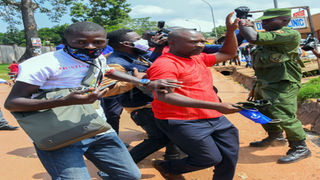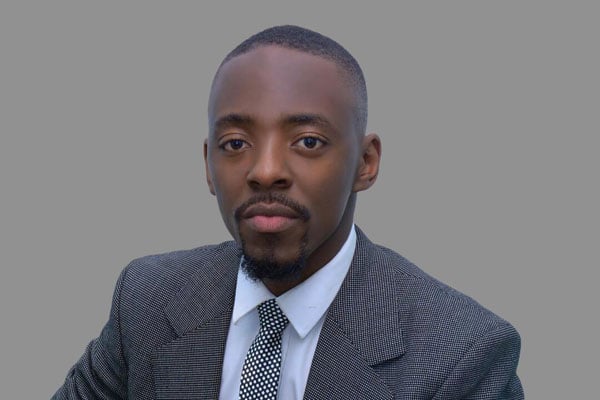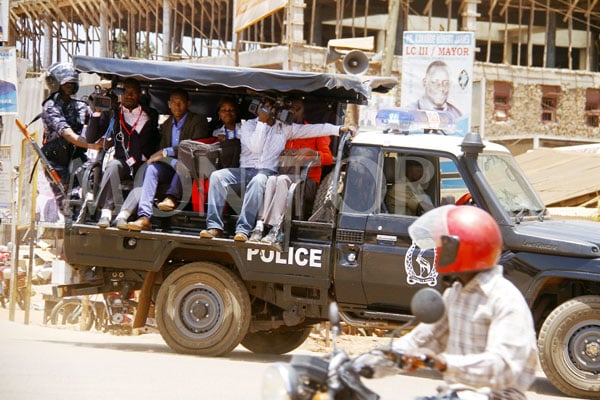
Special Reports
Prime
How EAC can improve press freedom
What you need to know:
- In the second part of a two-part series on media freedoms in the region, we look at how the East African Community is rated and what can be done to make things better.
- Irrefutably, the EAC region’s ever present illiberalism imaged in competitive authoritarianism against the Fourth Estate can be checked using reinvented functional frameworks and policies that supersede coercive power.
“One thing is – people here don’t just say things in the media as they wish because there are always repercussions,” said a female Rwandan national, who preferred anonymity for fear of being victimised.
Speaking from the capital Kigali, her September 28 remarks spell no doubts over why the country is in 2022 ranked 136/180, by Reporters Without Borders (RSF), as the poorest recogniser of press freedom among the now seven-member states of the East African Community (EAC).
Positioned 69th with a 64 percent score, Kenya is the only EAC State within the top 100 press freedom index ranks, according to RSF.
“This means there is a lot to be done to enhance press freedom and implies that a lot of important information goes unreported due to fear,” Dr Gerald Walulya, lecturer at Makerere University in central Uganda, said.
Notably, each of the EAC partner-countries has its own share of serious threats to press freedom, for instance, Rwandan journalist in Uganda, William Shyaka Mutabazi, 27, knows he “would be surveilled or even killed for telling Sunday Monitor hard things but will return to work in his home country from January 2023 since journalism there pays better and the profession is respected.”
In Kenya, newsman Nemasis Musene suggests that “any media personality’s survival heavily depends on tribe and the political side you take to protect you.”
Amid unending hostilities, hundreds of practitioners in East Africa’s tight politically and economically controlled Fourth Estate remain the prime target of sustained severe crackdowns and a raft of concealed legislations in the last two decades. Essentially, the state of journalism in the region now revolves on an enduring question… How can we improve?
Challenging the laws
South Sudan and Uganda, last month, edged closest to adopting controversial amendments that critics say headwind fundamental press freedoms.
In Uganda, overwritten anger in traditional and social media faults the Bill considered by many journalists as highly contrary to a prominent lead judgment by Supreme Court Justice Joseph Mulenga against criminalisation of false news in a February 13 ruling- four years into the third millennium.
In his weekly column, Monitor Publications newspaper general manager editorial, Daniel Kalinaki, on September 15 opined that the “law is written by a sad man just out of a dark damp cave.”
Thousands also argue that the Bill is emboldened by legislators pursuing their own agenda to bulletproof themselves against repugnant opinions by fast-growing digital users, including the press.
However, Kampala City lawyer Timothy Amanya illustrates that journalists can seek legal redress to challenge such laws that put press freedom in the line of attack.
“The laws can be modified to be more comprehensive to meet the trends of the day,” he said on September 28.
New laws to protect journalism
While all EAC nations constitutionally recognise freedom of expression as a crucial path for democratic governance, several repressive clauses account for recurrent unapologetic clampdowns on the Fourth Estate.
In 2004, deceased Justice Constance Byamugisha found Section 50 of the 1995 Ugandan Constitution inconsistent with Article 29, which guarantees protection of press freedoms.
Similarly, lawyer Amanya singles out most EAC State provisions on freedom of expression “for not being vetoed, which consequents abuse of justice systems against the press.”
“Interpretation of the law should be independent from State prejudice,” he highlighted.
Like never before, media gurus find it crucial for the “East African Legislative Assembly (Eala) to adopt a new significant legislation to protect journalism, which is endangered in the wake of adversarial relationships with stakeholders.”
Renowned Tanzanian researcher and investigative journalist Khalifah Said, on September 28, longed for “Eala to adopt new legislations that protect the media to set precedent for second-tier regional parliaments.”
But both Counsel Amanya and Dr Walulya highly pitched that new legislations fall far from sufficiency as free press enablers.
“Law enforcement and interpretation arms also need to be guided further. Also, there is need to apportion liability for enforcement personnel that go contrary to the law,” Mr Amanya told Monitor.
For Dr Walulya, EAC countries should remove all barriers, including Media Council Acts that inhibit press freedom.
Economic transparency
Official data reveals over 70 percent media outlets in East Africa are owned by oligarchs, which media experts believe justifies prevalent journalism influenced by editorial gratitude.
In a major State reprisal, Sunday Monitor, could have very easily never made it to the stands beyond the early 2000s after advertising revenue was deprived from the private Ugandan newspaper for publishing stories the 1986 Museveni establishment was unhappy with.
But to overcome this kind of economic distrust as a threat to press freedom, head of postgraduate journalism studies at Uganda Christian University, Dr Annette Kezaabu, on September 28, told Monitor thus: “Transparency in dealing with economic-state power and holding the powerful to account should never be omitted in addition to developing new fund-sourcing models like news website paywalls.”
Speaking economics, press freedom is also troubled by meager pays with journalists salaries averaging just over $200 (about Shs760,000) amid extremely poor working conditions in multiple EAC states.
On September 28, Ugandan freelance journalist Peninah Nyangoma Rukundo quickly labelled “poor pay as an obstacle to egalitarian press that should be addressed urgently.”
Lifting media bans
Tanzanian President John Pombe Magufuli’s shock death in March 2021, offered a turning point in the history of journalism across the EAC bloc. His successor, Samia Suluhu Hassan would – barely a year after his demise – direct lifting a ban on over five media outlets gagged in a blanket ban by Magufuli.
Despite Suluhu’s immediate caution for previously banned media to “follow the law and government guidelines,” reporters there say they now see a huge difference in post-Magufuli Tanzania.
“There’s no sheriff in town,” journalist Khalifah noted.
With no single journalist kidnapped or harassed in the last one year, Tanzania is now daring to have fully liberal media outlets shielded by landmark constitutional reforms that might create a new media law becoming the region’s first-ever encyclopedia for outdoing anti-media totalitarianism.
Avoid double standards
Sentenced to 15 years in 2010 for conspiracy against the State, Rwandan opposition figure Victoire Ingabire was pardoned in 2018 by the head of state’s prerogative.
“I have been seeing journalists writing all kinds of things trying to make her an angel of freedom,” Rwandan President Paul Kagame said as he rebuked a BBC journalist in June for “irresponsible reporting.”
He emphasised that such excesses of “negative framing and double standards in reporting” eventualise presumed state violation of media rights. Kagame further vowed that his government would not relent authoritarian approaches where media framing is perceived.
At least two other sitting EAC presidents Museveni [Uganda] and William Ruto [Kenya], early this year, expressed approval that journalists must report responsibly to straighten their freedoms that contemporarily appear to be in a radically changing intricate relationship with governments.
In agreement, journalist Mutabazi says: “In our region, with a background of genocides and civil unrests that have claimed over three million people in the last 20 years, the press should learn to draw a line between media freedoms and hate speech or propaganda.”
Such statements denote undefined borders of what powerful actors may presume holy or unholy from the media, affording governments unchecked luxury to determine right and wrong.
“Because of that, journalists have retreated to less risky beats and there is need to establish infrastructure that fosters press freedom transcending any particular political regime,” Dr Walulya says, but raises notice “that press freedom can’t be absolute.”
Unified associations
On September 25, outrage emerged after Warriors rugby ‘player and coach’ Gabriel Aredo viciously wrestled down Vision Group sports journalist Johnson Were at a tourney in Jinja.
Now the latest known public attack on a reporter in Uganda, the incident triggered wide spread calls for maximum deterrent penalties against the ex-national team player, which forced Aredo’s club to suspend and empanel a committee to probe and potentially punish him.
Besides, the Uganda Sports Press Association (USPA) held a successful rugby coverage boycott, demanding Aredo is sanctioned.
The swift responses obscured – albeit briefly – the usual disregard to penalising violators of press freedom.
Referring to the above rapid developments, Joseph Tumwesigye, a journalist at Nation Media Group, wants unending unified regional associations for press demands to materialise.
“When security forces rough up journalists, press associations always propose boycotts to military and police events coverage but easily give in yet these unions should always save journalists and champion their concerns in such situations,” he said on September 27.
Tunwesigye also urged institutions such as the army that quickly become brutal against journalists to deploy internal instruments that act against errant personnel who omit universally recommended press rights.
Irrefutably, the EAC region’s ever present illiberalism imaged in competitive authoritarianism against the Fourth Estate can be checked using reinvented functional frameworks and policies that supersede coercive power.
This story has been run with support from the Media Freedom Committee (MFC) Uganda in connection with WAN-IFRA.





